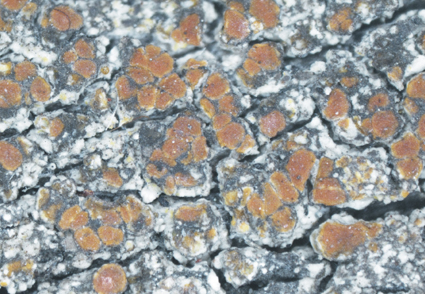Abstract
A new species is described in the genus Tayloriellina from the Bolivian dry Inter-Andean Valleys. Tayloriellina malmeana sp. nov. is characterized by an orange-yellow to creamy/gray, areolate-subsquamulose to granulose thallus, numerous apothecia with intensive orange discs, which dominate the thallus, and the presence of scarce globose isidia, concolorous with the thallus. The new species forms a sister lineage with T. microphyllina, reflecting their geographic origins in the Americas. Both taxa are easily distinguished by morphology because T. microphyllina produces a well-developed, dark orange thallus, distinct orange soralia, and smaller ascospores. The newly described species is discussed in reference to the poorly known South American species, “Caloplaca” byrsonimae s. lat. and “C.” trabicola.
References
- Arup, U., Søchting, U. & Frödén, P. (2013) A new taxonomy of the family Teloschistaceae. Nordic Journal of Botany 31: 16–83. https://doi.org/10.1111/j.1756-1051.2013.00062.x
- Bungartz, F. (2002) Morphology and anatomy of the fertile structures. In: Nash III, T.H., Ryan, B.G., Gries, C. & Bungartz, F. (Eds.) Lichen flora of the Greater Sonoran Desert Region 1. Arizona, Tempe, Lichens Unlimited, Arizona State University, pp. 24–35.
- Gaya, E., Fernández-Brime, S., Vargas, R., Lachlan, R.F., Gueidan, C., Ramírez-Mejía, M. & Lutzoni, F. (2015) The adaptive radiation of lichen-forming Teloschistaceae is associated with sunscreening pigments and a bark-to-rock substrate shift. Proceedings of the National Academy of Sciences 112: 11600–11605. https://doi.org/10.1073/pnas.1507072112
- Katoh, K., Rozewicki, J. & Yamada, K.D. (2019) MAFFT online service: multiple sequence alignment, interactive sequence choice and visualization. Briefings in Bioinformatics 20: 1160–1166. https://doi.org/10.1093/bib/bbx108
- Kondratyuk, S.Y., Kärnefelt, I., Thell, A., Elix, J.A., Kim, J., Jeong, M.-H., Yu, N.-N., Kondratiuk, A. & Hur, J.-S. (2014) A revised taxonomy for the subfamily Xanthorioideae (Teloschistaceae, Ascomycota) based on molecular phylogeny. Acta Botanica Hungarica 56: 141–178. https://doi.org/10.1556/ABot.56.2014.1-2.12
- Kondratyuk, S.Y., Kärnefelt, I., Thell, A., Elix, J.A., Kim, J.-A., Kondratiuk, A.S. & Hur, J.-S. (2015a) Brownlielloideae, a new subfamily in the Teloschistaceae (Lecanoromycetes, Ascomycota). Acta Botanica Hungarica 57: 321‒343. https://doi.org/10.1556/034.57.2015.3-4.6
- Kondratyuk, S.Y., Kim, J.A., Yu, N.-H., Jeong, M.-H., Jang, S.H., Kondratiuk, A.S., Zarei-Darki, B. & Hur J.-S. (2015b) Zeroviella, a new genus of xanthorioid lichens (Teloschistaceae, Ascomycota) proved by three gene phylogeny. Ukrainian Botanical Journal 72: 574–584. https://doi.org/10.15407/ukrbotj72.06.574
- Kondratyuk, S.Y., Lőkös, L, Kim, J.A., Kondratiuk, A.S., Jeong, M.H., Jang, S.H., Oh, S.O., Wang, X.Y. & Hur, J.-S. (2016) Fauriea, a new genus of the lecanoroid caloplacoid lichens (Teloschistaceae, lichen-forming ascomycetes). Acta Botanica Hungarica 58: 303–318. https://doi.org/10.1556/ABot.58.2016.3-4.6
- Larsson, A. (2014) AliView: a fast and lightweight alignment viewer and editor for large data sets. Bioinformatics 22: 3276–3278. https://doi.org/10.1093/bioinformatics/btu531
- Lumbsch, H.T., Ahti, T., Altermann, S., Amo De Paz, G., Aptroot, A., Arup, U., Bárcenas Peña, A., Bawingan, P.A., Benatti, M.N., Betancourt, L., Björk, C.R., Boonpragob, K., Brand, M., Bungartz, F., Caceres, M.E.S., Candan, M., Chaves, J.L., Clerc, P., Common, R., Coppins, B.J., Crespo, A., Dal-Forno, M., Divakar, P.K., Duya, M.V., Elix, J.A., Elvebakk, A., Fankhauser, J.D., Farkas, E., Ferraro, L.I., Fischer, E., Galloway, D.J., Gaya, E., Giralt, M., Goward, T., Grube, M., Hafellner, J., Hernández, J.E., Herrera-Campos, M.A., Kalb, K., Kärnefelt, I., Kantvilas, G., Killmann, D., Kirika, P., Knudsen, K., Komposch, H., Kondratyuk, S., Lawrey, J.D., Mangold, A., Marcelli, M.P., McCune, B., Messuti, M.I., Michlig, A., Gonzalez, R.M., Moncada, B., Naikatini, A., Nelsen, M.P., Ovstedal, D.O., Palice, Z., Papong, K., Parnmen, S., Perez-Ortega, S., Printzen, C., Rico, V.J., Plata, E.R., Robayo, J., Rosabal, D., Ruprecht, U., Allen, N.S., Sancho, L., De Jesus, L.S., Vieira, T.S., Schultz, M., Seaward, M.R.D., Serusiaux, E., Schmitt, I., Sipman, H.J.M., Sohrabi, M., Søchting, U., Søgaard, M.Z., Sparrius, L.B., Spielmann, A., Spribille, T., Sutjaritturakan, J., Thammathaworn, A., Thell, A., Thor, G., Thus, H., Timdal, E., Truong, C., Turk, R., Tenorio, L.U., Upreti, D.K., Van den Boom, P., Rebuelta, M.V., Wedin, M., Will-Wolf, S., Wirth, V., Wirtz, N., Yahr, R., Yeshitela, K., Ziemmeck, F., Wheeler, T. & Lücking, R. (2011) One hundred new species of lichenized fungi: a signature of undiscovered global diversity. Phytotaxa 18: 1–127. https://doi.org/10.11646/phytotaxa.18.1.1
- Malme, G.O.A. (1926) Lichenes blasteniospori Herbarii Regnelliani. Arkiv för Botanik 20A: 1–51.
- Magnusson, A.H. (1950) Lichens from Uruguay. Meddelande Göteborgs botaniska trädgård 18: 213–237.
- Magnusson, A.H. (1953) New lichens mainly Rinodina species from U.S.A. Botaniska Notiser 2: 187‒196.
- Müller, J. (1888) Lichenes Paraguayenses. Revue mycol., Toulouse 10: 53‒68.
- Rambaut, A. (2018) Figtree v1.4.4. Available from: http://tree.bio.ed.ac.uk/software/figtree (accessed 30 May 2023)
- Räsänen, V. (1939) Contribución a la flora liquenológica sudamericana. Anales de la Sociedad Científica Argentina 128: 133‒147.
- Ryan, B.D., Bungartz, F. & Nash III, T.H. (2002) Morphology and anatomy of the lichen thallus. In: Nash III, T.H., Ryan, B.G., Gries, C. & Bungartz, F. (Eds.) Lichen flora of the Greater Sonoran Desert Region 1. Arizona, Tempe, Lichens Unlimited, Arizona State University, pp. 8–23.
- Ryan, B.D., Bungartz, F., Hagedorn, G. & Rambold G. (Eds.) (2012) LIAS glossary – A Wiki-based Online Dictionary for Ascomycete Terminology used by LIAS, the Global Information System for Lichenized and Non-Lichenized Ascomycetes. [http://glossary.lias.net]
- Søchting, U., Søgaard, M.Z., Sancho, L.G. & Arup, U. (2021) The lichen genus Villophora (Teloschistaceae, Ascomycota). Lichenologist 53: 245‒255. https://doi.org/10.1017/S0024282921000141
- Stamatakis, A. (2014) RAxML version 8: a tool for phylogenetic analysis and post-analysis of large phylogenies. Bioinformatics 30: 1312‒1313. https://doi.org/10.1093/bioinformatics/btu033
- Taylor, T. (1847) New lichens, principally from the Herbarium of Sir William J. Hooker. London Journal of Botany 6: 148‒197.
- Tuckerman, E. (1882) A synopsis of the North American lichens 1: 1‒261. https://doi.org/10.5962/bhl.title.23780
- Wetmore, C.M. (2004) The sorediate corticolous species of Caloplaca in North and Central America. Bryologist 107: 505‒520. https://doi.org/10.1639/0007-2745(2004)107[505:TSCSOC]2.0.CO;2
- Wetmore, C.M. (2007) Caloplaca. In: Nash III, T.H., Gries, C. & Bungartz F. (Eds.) Lichen Flora of the Greater Sonoran Desert Region 3. Arizona, Tempe: Lichens Unlimited, Arizona State University, pp. 179–220.
- Wilk, K., Pabijan, M., Saługa, M., Gaya, E. & Lücking, R. (2021) Phylogenetic revision of South American Teloschistaceae (lichenized Ascomycota, Teloschistales) reveals three new genera and species. Mycologia 113: 278‒299. https://doi.org/10.1080/00275514.2020.1830672
- Zahlbruckner, A. (1930 [1931]) Catalogus Lichenum Universalis 7:1–784. https://doi.org/10.1007/978-3-7091-4178-6_1


